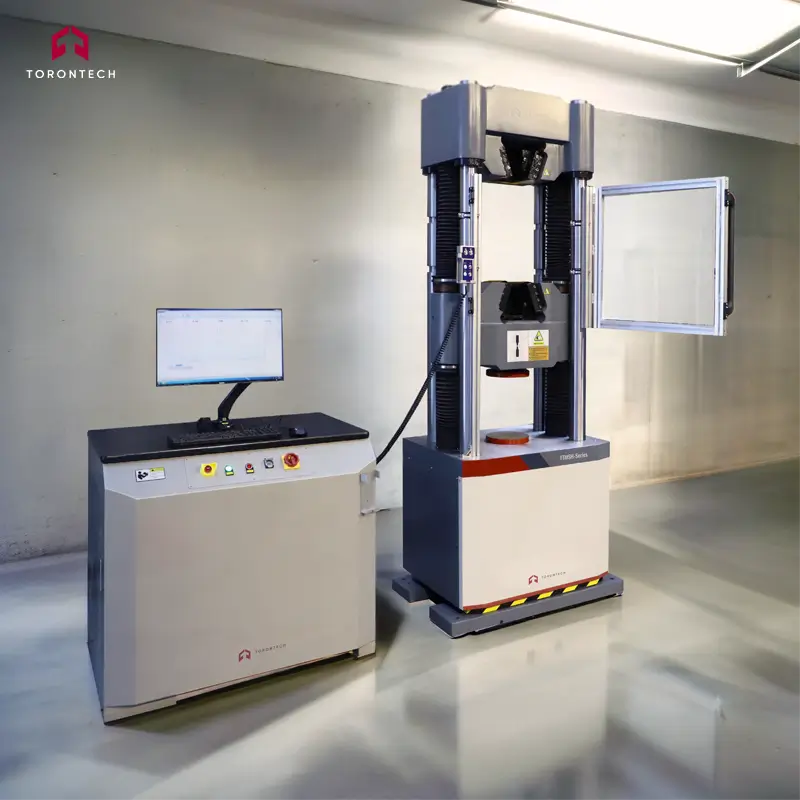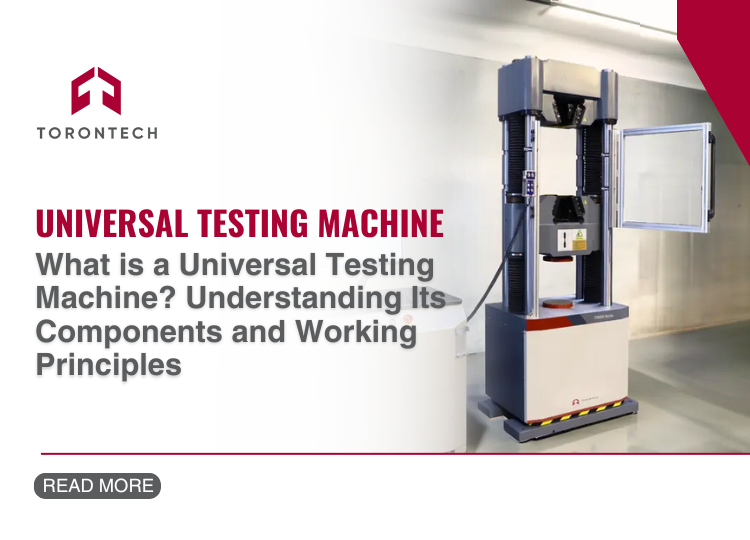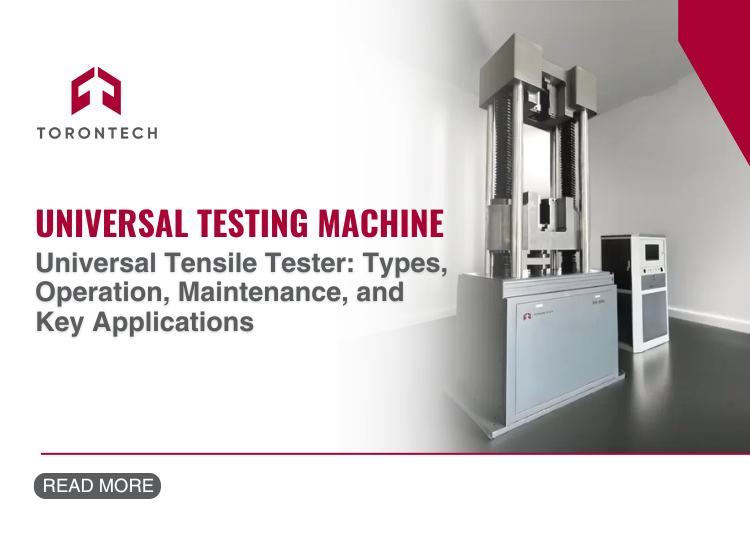Universal Testing Machines - Tensile Tester
A universal testing machine, or universal tensile testing machine, measures the strength and durability of materials. It applies force to test tension, compression, bending, or shear—helping you find out how materials perform under stress.
Torontech offers a reliable solution for quality control, product development, and compliance testing.
Built to Test Any Material
Use one machine to test:
- Metals
- Plastics
- Rubber
- Composites
- Textiles
What Makes It a Smart Choice
- Fast and Accurate Results
Know exactly how strong your material is, every time. - Wide Load Capacity
Test samples from 10 kN up to 3000 kN. - User-Friendly Software
Set up, run, and export test results with just a few clicks. - Reliable Frame Structure
Built for stable, repeatable measurements over years of use. - Low Maintenance
Fewer breakdowns mean lower costs and less downtime. - International Standards Ready
Fully meets ASTM, ISO, and other testing protocols. - Designed to Save Time and Cost
Torontech’s universal tensile testing machine combines performance and value. It helps manufacturers reduce product failure, shorten testing time, and improve confidence in every batch.
Designed to Save Time and Cost
Torontech’s universal tensile testing machine combines performance and value. It helps manufacturers reduce product failure, shorten testing time, and improve confidence in every batch.
Product Categories
Single Column Universal Testing Machine Tensi-10
Tensi-10 offers up to 10kN testing for tension, compression, flexure, and more. Equipped with DOLI control and extensive accessories, it suits rubber, plastics, films, textiles, and components.
Electromechanical Universal Testing Machine
Torontech’s TTM-Series UTMs deliver 5kN–600kN testing for metals, plastics, rubber, and more. Built with rigid frames, DOLI control, and flexible configurations for all ISO/ASTM applications.
Servo Hydraulic Universal Testing Machine
The TT-MSH Series performs high-force tensile, compression, and bend tests up to 2000kN. Dual-space design, wedge grips, and rigid 4-column frame ensure precision, efficiency, and safety across demanding applications.
Hydraulic Universal Testing Machine 3,000 kN – TTM-3000
TTM-3000 delivers up to 3000kN force for tensile, compression, and bending tests. Built for ASTM E8 compliance, it features servo control, real-time data display, and robust software for labs and research facilities.
Horizontal Tensile Testing Machine – High Capacity Tensile Test Bed
Designed for wires, ropes, and overhead conductors, this horizontal tensile tester provides accurate hydraulic loading, custom grips, advanced sensors, and flexible frame lengths. Ideal for demanding strength tests.
Horizontal Tensile Testing Machine for Overhead Conductors & Cables - TT-HTTM Series
Purpose-built for cables, shackles, and chains, this horizontal tester features generous bed clearance, reverse-load calibration, ±0.5% accuracy, and configurable software for repeatable, high-strength tests.
Non-Contact Video Extensometer – Quantum Series
Using digital imaging, the Quantum Series ensures safe, contactless strain measurement. Ideal for high-risk tests, it offers full tracking, analog/digital I/O, and post-test extensometer adjustment.
Tensile Test Chambers and Furnaces
ToronTTC and ToronTF Series provide controlled thermal environments from -150°C to 1100°C. Designed for universal testing machines, they ensure accurate, repeatable material testing across critical temperature ranges.
FAQ About Universal Testing Machine
What is a universal testing machine?
A Universal Testing Machine (UTM) is a flexible mechanical testing system used to assess the strength, stiffness, and performance of materials under tension, compression, bending, and more.
Known by various names—such as tensile tester or tensile strength testing machine—it applies controlled force and records material response to determine mechanical properties like elongation, yield strength, and fracture point.
The term “universal” reflects its ability to run multiple standardized tests (tensile, flexural, peel, shear, puncture) using interchangeable fixtures. Equipped with components like load cells, crossheads, and grips, and operated through specialized software, a UTM ensures materials meet ASTM, ISO, and other international standards.
It is widely used in product development, quality control, and material research across industries ranging from plastics and metals to textiles and composites.
How does a universal testing machine work?
A UTM Machine works by applying a controlled force to a test specimen while measuring its response to stress. The specimen is secured between grips or fixtures, and the machine’s crosshead moves either upward or downward depending on the test type: tensile, compression, or flexural.
A load cell measures the applied force, while extensometers or displacement sensors track deformation. These signals are processed through software that displays real-time stress-strain data.The machine continues loading until the material yields, breaks, or reaches a predefined limit, allowing accurate evaluation of properties like tensile strength, modulus of elasticity, or elongation.
What is an UTM machine used for?
A Universal Testing Machine is used to measure the mechanical properties of materials such as metals, plastics, rubber, textiles, composites, and more. Common tests include tensile strength, compression resistance, flexural strength, shear, peel, and puncture tests.
Industries use UTMs to ensure materials meet quality, safety, and regulatory standards during product development and manufacturing. It supports a wide range of standards like ASTM, ISO, and DIN, making it essential for research labs, quality control departments, and educational institutions.
What test is UTM used for?
A UTM machine is used for a wide range of mechanical tests, including:
- Tensile Test – Measures how a material stretches under tension until it breaks.
- Compression Test – Evaluates how a material reacts to crushing forces.
- Flexural (Bend) Test – Assesses a material’s bending strength and stiffness.
- Peel Test – Determines the adhesive strength between bonded materials.
- Shear Test – Measures resistance to forces that cause sliding failure.
- Puncture and Tear Tests – Analyze resistance to penetration or tearing, especially for films and fabrics.
With the right grips and fixtures, a UTM can perform nearly all static mechanical tests across a broad range of materials, following standards like ASTM D638, ISO 527, and more.
How do you perform a UTM tensile test?
To perform a tensile test using a Universal Testing Machine (UTM):
- Prepare the specimen according to the relevant standard (e.g., ASTM D638 for plastics, ASTM E8 for metals).
- Mount the specimen between the upper and lower grips of the machine.
- Set the test parameters—including gauge length, crosshead speed, and maximum load—using the control software.
- Begin the test, allowing the machine to pull the specimen at a constant rate until it breaks.
- Record and analyze results, such as tensile strength, yield point, elongation, and modulus of elasticity, based on the force and displacement data.
The test must be conducted under controlled environmental conditions to ensure accuracy and repeatability, conforming to standards like ASTM, ISO, or DIN.







